| Srl | Item |
| 1 |
ID:
152502
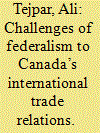

|
|
|
|
|
| Summary/Abstract |
As one of the first “second-generation” free trade agreements that address indirect and non-tariff barriers, the Canada–European Union Comprehensive Economic and Trade Agreement (CETA) is likely to serve as an international model. CETA, however, highlights significant challenges for Canadian federalism in both the negotiation and implementation processes of this and any such future trade agreements. While the inclusion of sub-federal governments allows for provinces/territories to help shape the provisions that fall within their jurisdictions, this paper argues that subsequent challenges arise in conveying a unified Canadian commitment to implement the agreement. Overall, the CETA negotiations demonstrated the significant institutional weaknesses of current federal–provincial/territorial relations with respect to international trade agreements. In the Canadian context, this suggests a need for “summit federalism” to ensure that all federal–provincial/territorial governments align their terms and interests and convey a unified commitment to fulfilling Canada’s current and future international trade agreements.
|
|
|
|
|
|
|
|
|
|
|
|
|
|
|
|
| 2 |
ID:
190751
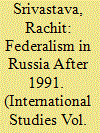

|
|
|
|
|
| Summary/Abstract |
This article examines the federalization process and the spread of federalism in Russia after 1991. The Russian federal system has undergone several changes since the collapse of the Soviet Union. It arose as a result of several contracts signed between the federal government and the subjects. The federal structure of Russia is asymmetric and characterized by conflicts due to the system of division of power between the federal government and the subjects. The creation of an institutional mechanism was done to facilitate the application of the federal principles effectively. The President’s full control over political affairs, foreign policy and the economy can harm the successful development of the federal state in Russia.
|
|
|
|
|
|
|
|
|
|
|
|
|
|
|
|
| 3 |
ID:
140681
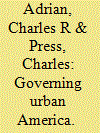

|
|
|
|
|
| Edition |
3rd ed.
|
| Publication |
New York, McGraw-Hill Book Company, 1968.
|
| Description |
vii, 530p.hbk
|
| Series |
Mc Graw-Hill Series in Political Science
|
|
|
|
|
|
|
|
|
|
|
|
Copies: C:1/I:0,R:0,Q:0
Circulation
| Accession# | Call# | Current Location | Status | Policy | Location |
| 006897 | 973/ADR 006897 | Main | On Shelf | General | |
|
|
|
|
| 4 |
ID:
174690
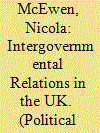

|
|
|
|
|
| Summary/Abstract |
Brexit and the coronavirus pandemic have put relationships between the UK government and its devolved counterparts under growing strain. Tensions generated by both of these developments have exposed the inadequacies of the existing, under‐developed system for bringing governments together in the UK. The limitations of the current system include the ad hoc nature of intergovernmental meetings, and their consultative rather than decision‐making character. Drawing upon an analysis of how intergovernmental relationships are structured in five other countries, the authors offer a number of suggestions for the reconfiguration of the UK model. They explore different ways of enabling joint decision making by its governments, and argue against the assumption that England can be represented adequately by the UK administration. Without a serious attempt to address this dysfunctional part of the UK’s territorial constitution, there is every prospect that relations between these different governments will continue to deteriorate.
|
|
|
|
|
|
|
|
|
|
|
|
|
|
|
|
| 5 |
ID:
088385
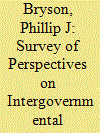

|
|
|
|
|
| Publication |
2009.
|
| Summary/Abstract |
The results of a survey of local government officials from the Slovak and Czech Republics taken in December of 2005 are presented and analysed. Attitudes about and perspectives on intergovernmental fiscal relations in the two republics are probed. Differences and similarities in Czech and Slovak views are established regarding some of the perceptions of local autonomy and the sufficiency of available funds; whether or not public services are supplied by the appropriate levels of government; the potential benefits of adopting a serious rather than a nominal property tax; and the flexibility of local budget planning in Czech and Slovak cities and towns.
|
|
|
|
|
|
|
|
|
|
|
|
|
|
|
|
| 6 |
ID:
080463
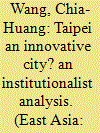

|
|
|
|
|
| Publication |
2007.
|
| Summary/Abstract |
This paper explores whether Taipei is an innovative city by critically examining Taipei's industrial and economic performance, developmental visions and spatial planning, as well as institutional settings and political contexts. With the aid of institutionalist perspective, the author argues that Taipei's innovative efforts are mostly policy innovation, rather than institutional innovation. The author also describes the institutional dynamics that have caused the lack of Taipei's institutional innovation. The case study of Taipei could be helpful in conducting comparative studies on urban innovation
|
|
|
|
|
|
|
|
|
|
|
|
|
|
|
|